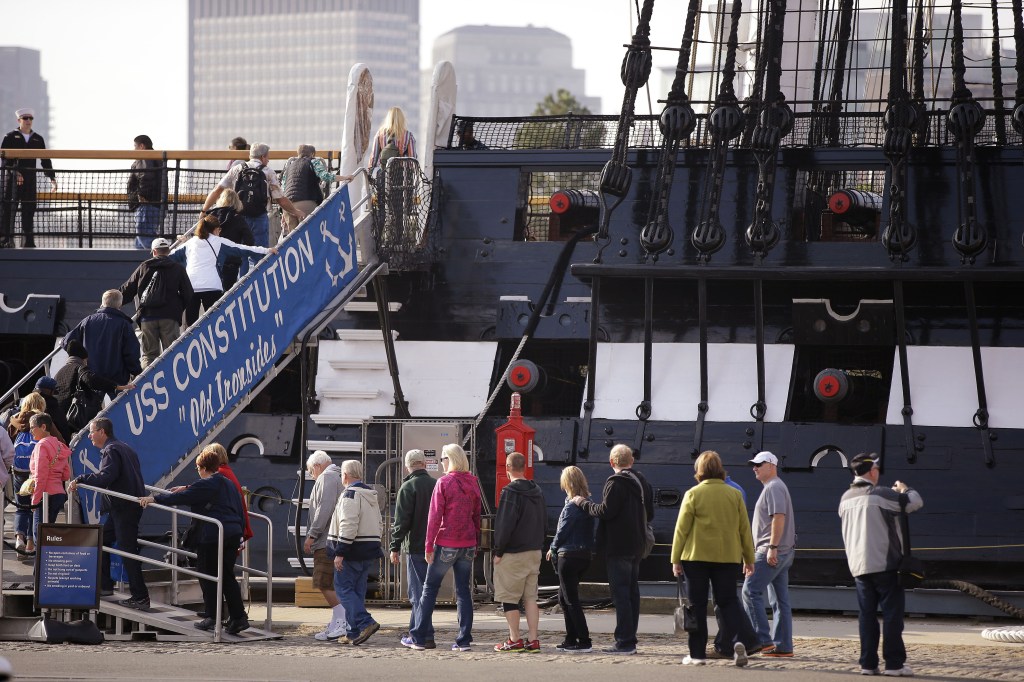WASHINGTON — The barricades were removed at Acadia National Park on Thursday, and scores of furloughed federal employees in Maine returned to their cubicles as the government resumed operations following a 16-day shutdown.
But while the end of the government shutdown eased political tensions in Washington – albeit temporarily – Democrats and union leaders in Maine criticized Republican Gov. Paul LePage for maintaining the “civil emergency” he declared to deal with federally funded state employees affected by the closure.
Most federal employees were told to report for work Thursday, less than 12 hours after Congress passed and President Obama signed a bill to fund agencies through mid-January and avoid a default on the government’s debts.
“We’re open and back in business,” said Len Bobinchock, deputy superintendent at Acadia National Park.
Like national parks across the country, Acadia gated off roads into the park, closed campgrounds and halted all public assistance except in response to emergency calls during the shutdown. As of Thursday, the Park Loop Road, Blackwoods campground and almost all other areas of the park were once again accessible to the public.
“Everything is open now that would normally be open at this time of the year,” Bobinchock said. Asked about the closure’s impact on the park during peak weeks for fall foliage, Bobinchock responded: “We haven’t had the opportunity to assess how many visitors may have been turned away.”
Other federal offices were attempting to catch up on 21/2 weeks worth of work.
“We are back … and ready to pick up where we left off,” said Marilyn Geroux, district director for the U.S. Small Business Administration in Maine. Geroux’s staff of eight people – who help small businesses acquire loans and provide other assistance – was furloughed during the shutdown.
“We are so glad to be back,” she said. “I am hoping it won’t cause too much of a disruption.”
Likewise, the Veterans Benefits Administration offices at VA Maine Healthcare Systems-Togus in Augusta were back at full-staff Thursday, according to a representative there. While veterans’ health care programs at Togus and across the nation were unaffected by the shutdown because of an exemption, about 30 to 35 staff in the Togus benefits office were furloughed last week. The temporary layoffs meant that veterans were unable to receive in-person assistance from VA staff, although claims processing continued.
Social Security Administration field offices in Maine had scaled back some of the administrative duties during the shutdown, such as replacing Social Security cards and correcting earnings records. A spokesman said field offices were operating at full capacity again Thursday.
National wildlife refuges – such as the Rachel Carson refuge in coastal southern Maine – had also reopened trails and areas popular with some hunters at this time of year.
“So permit holders are welcome to get back to hunting and people who need a permit can contact the refuge office,” said Terri Edwards, spokeswoman for the U.S. Fish and Wildlife Service’s New England regional office.
The post-shutdown situation was murkier at the State House, however.
LePage was the only governor in the country to grant himself the power to suspend state laws and regulations as a strategy to deal with the partial shutdown of the federal government. The governor has said that the emergency was declared to help federally-funded state workers laid off during the shutdown obtain unemployment benefits.
LePage had yet to lift the emergency order as of Thursday evening, prompting questions from the Maine State Employees Association and criticism from Maine Democrats.
Approximately 100 of the 2,739 federally-funded state workers were furloughed during the shutdown, with the remaining 2,600-plus facing likely furloughs unless federal dollars began flowing soon to the state. On Thursday many of them were back at work, including 52 employees at the disability claims center in Winthrop. Furloughed workers will receive compensation for the days they were out of work.
Employees association representatives met with LePage administration officials Thursday to discuss lifting the civil emergency and recalling over 40 civil employees laid off at the Department of Defense, Veterans and Emergency Management. Those workers were not back on the job Thursday.
In a news release sent Thursday evening LePage said defense workers would return to work Friday. However, the governor made no mention of the civil emergency or when he planned to lift it.
It’s unclear exactly why the administration delayed returning all furloughed workers or what concessions it was seeking from the union Thursday.
The bill that Congress passed Wednesday made it clear that states that floated the costs to keep federally funded state employees on the job would be reimbursed, and that furloughed employees would receive back wages.
Chris Quint, director of the state employees union, said there was no reason to delay returning the workers to their jobs.
Adrienne Bennett, the governor’s spokeswoman, said the emergency proclamation remained in place “as an administrative tool” to ensure the “orderly transition back to normal government operations.” Bennett would not say when the governor planned to lift the emergency.
Democratic leaders pressed the governor to lift the civil emergency.
“Since Day One we have asked Governor LePage to narrow the scope of his civil emergency so that his scope of power was transparent to all of us,” Senate President Justin Alfond, D-Portland, said in a statement. “Today, his civil emergency is unnecessary and to continue with it is perplexing. Maine workers should not go one more day under a cloud of uncertainty of when they’ll get their next paycheck.”
Earlier this week, the state employees union and the LePage administration struck a preliminary deal on how to proceed if the stalemate in Washington, D.C., went beyond Wednesday – the deadline for the debt ceiling.
The deal assured that state workers laid off during the shutdown would return to their same jobs when the stalemate ended and it affirmed bumping rights, which allow more senior employees to avoid layoffs by “bumping” employees with less time of service out of their jobs.
State workers laid off during the shutdown were encouraged to file for unemployment benefits. However, it appears few of them will actually collect unemployment checks, according to Julie Rabinowitz, a spokeswoman with the Maine Department of Labor. Rabinowitz said that the waiting period built into the claims system made it unlikely that benefit checks would go out to furloughed state employees.
Rabinowitz said there was no way to tell how many state workers filed for unemployment. Claims do not necessarily reflect benefits paid to employees.
“It’s unlikely that we paid very much,” Rabinowitz said. She said there’s a mechanism in the unemployment claims system to ensure that furloughed workers reimbursed by the government can’t collect benefits, too.
Steve Mistler can be contacted at 791-6345 or at:
smistler@pressherald.com
Washington Bureau Chief Kevin Miller can be contacted at 317-6256 or at:
kmiller@pressherald.com
Send questions/comments to the editors.





Success. Please wait for the page to reload. If the page does not reload within 5 seconds, please refresh the page.
Enter your email and password to access comments.
Hi, to comment on stories you must . This profile is in addition to your subscription and website login.
Already have a commenting profile? .
Invalid username/password.
Please check your email to confirm and complete your registration.
Only subscribers are eligible to post comments. Please subscribe or login first for digital access. Here’s why.
Use the form below to reset your password. When you've submitted your account email, we will send an email with a reset code.